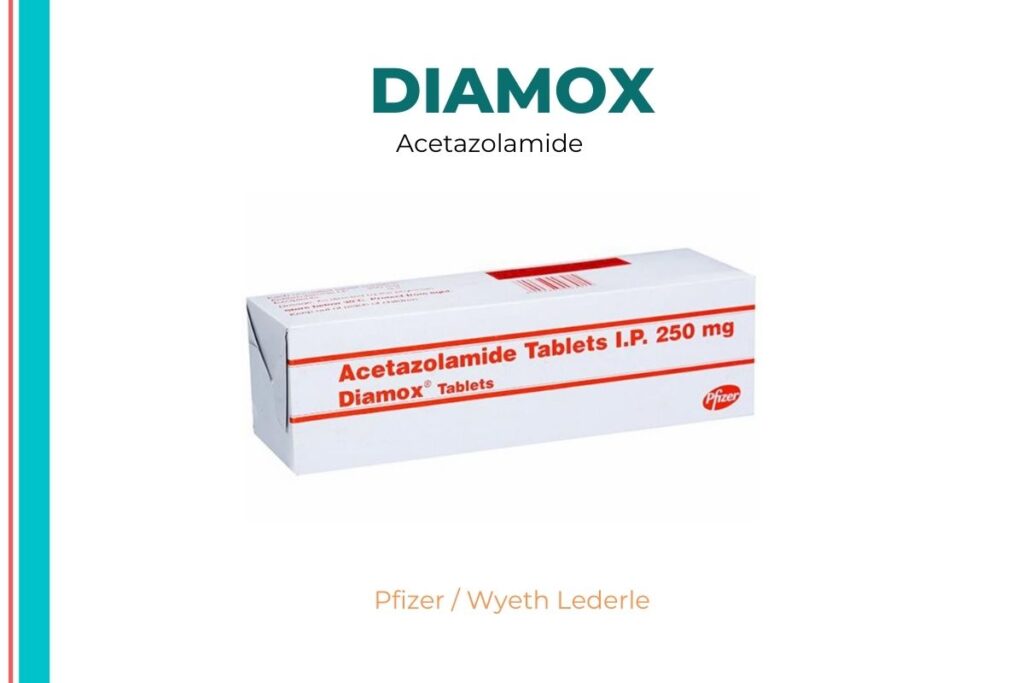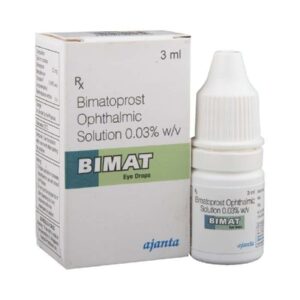Diamox
Diamox belongs to a class of drugs known as carbonic anhydrase inhibitors, which are used to treat glaucoma, oedema (fluid retention), epilepsy, and altitude sickness. Glaucoma is an eye disorder in which unusually high pressure in the eye damages the optic nerve. Epilepsy is a nervous system illness caused by abnormal nerve cell activity in the brain. Fluid retention is a condition in which fluids build up in the tissues of the body.
Diamox comprises the chemical acetazolamide, which inhibits the enzyme carbonic anhydrase. This inhibitory activity reduces aqueous humor secretion, lowering intraocular pressure. Diamox inhibits the carbonic anhydrase enzyme, which helps to prevent aberrant, excessive discharge from central nervous system neurons, and so helps to cure certain central nervous system dysfunctions like epilepsy. Diamox lowers fluid retention by reducing the activity of carbonic anhydrase.
Take Diamox exactly as directed. Depending on your medical condition, you should take Diamox for as long as your doctor has prescribed it. Certain typical adverse effects, such as nausea, vomiting, diarrhea, headache, and increased urination, may occur in some situations. The majority of these adverse effects do not necessitate medical treatment and will subside with time. However, if you are experiencing these adverse effects on a regular basis, you should consult your doctor.
If you’re pregnant, suspect you’re pregnant, or plan to become pregnant, don’t take Diamox. If you are breastfeeding, talk to your doctor before taking Diamox. Diamox is not recommended for children since its safety and efficacy have not been shown. Diamox can cause dizziness and drowsiness, so only drive if you are fully awake. To avoid any negative effects or interactions, keep your doctor informed about your health condition and the medications you’re taking.
Glaucoma, fluid retention/oedema, epilepsy/seizures, and mountain sickness are all conditions that Diamox can help with.

Medicinal Advantages
Diamox belongs to a class of drugs known as carbonic anhydrase inhibitors, which are used to treat glaucoma, oedema (fluid retention), epilepsy, and altitude sickness. Diamox works by blocking the enzyme carbonic anhydrase. This inhibitory activity reduces aqueous humor secretion, lowering intraocular pressure. Diamox inhibits the carbonic anhydrase enzyme, which helps to prevent aberrant, excessive discharge from central nervous system neurons, and so helps to cure certain central nervous system dysfunctions like epilepsy. Diamox lowers fluid retention by reducing the activity of carbonic anhydrase. Diamox can also be used to treat muscle weakness and periodic paralysis, as well as to relieve pressure in the spinal cord and brain.
Use Instructions
Diamox can be taken with or without food. Your doctor will determine how long you need to take Diamox based on your condition. Tablet/Capsule: Do not crush or chew the tablet/capsule; instead, swallow it whole with water. Do not self-administer the injection; it will be delivered by a healthcare professional.
Store in a cool, dry location away from direct sunlight.
Diamox Side Effects
Headache
Nausea
Vomiting
Diarrhea
Urination is becoming more frequent.
Appetite loss.
Dizziness
Drug Recommendations
If you have severe kidney/liver problems, chronic non-congestive angle-closure glaucoma, Addison’s disease, low sodium and/or potassium levels, or high chlorine levels, do not use Acetazolamide. If you have lung issues, kidney stones, electrolyte imbalance, adrenal gland problems, diabetes, or heart problems, tell your doctor before using Acetazolamide. If you are pregnant, suspect you are pregnant, or plan to become pregnant, avoid taking Acetazolamide. If you are breastfeeding, talk to your doctor before using Acetazolamide. Acetazolamide is not advised for children since its safety and efficacy have yet to be determined. Because acetazolamide might produce dizziness and sleepiness, only drive if you are fully awake. Because acetazolamide can make your skin more sensitive to the sun, wear protective clothing and sunscreen while going outside.
Interactions Between Drugs
Interactions between drugs: Acetazolamide may interact with cardiac glycosides (digoxin), blood thinners (warfarin), anti-diabetics (metformin, gliclazide), anti-convulsants (phenytoin, primidone, carbamazepine, topiramate), steroid (prednisolone), anti-glaucoma agents (dorzolamide, brinzolamide), anti-arrhythmic (quinidine), anti-maniac
No drug-food interactions have been discovered or established.
Acetazolamide may interact with a variety of diseases, including severe kidney/liver disorders, chronic non-congestive angle-closure glaucoma, Addison’s disease, low sodium and/or potassium levels, and high chlorine levels.
Safety Suggestions
ALCOHOL
Alcohol consumption should be avoided or limited because it can cause dizziness and sleepiness.
PREGNANCY
Acetazolamide is classified as a pregnancy category C drug. If you are pregnant, suspect you are pregnant, or plan to become pregnant, avoid using Acetazolamide. If you have any concerns about this, please visit your doctor.
BREAST FEEDING
If you are breastfeeding, see your doctor before taking Acetazolamide; your doctor will determine whether or not Acetazolamide can be taken by breastfeeding moms.
DRIVING
Acetazolamide can make you dizzy and sleepy. As a result, refrain from driving or operating machinery until your vision has improved.
LIVER
It’s possible that you’ll need to alter your liver dose. If you have serious liver problems, you should avoid taking Acetazolamide. If you have any concerns about the use of Acetazolamide in individuals with liver disease, please visit your doctor.
KIDNEY
It’s possible that you’ll need to alter your KIDNEY dose. If you have or have had serious kidney issues, you should not use Acetazolamide. If you have any concerns about the use of Acetazolamide in individuals with kidney impairment, please visit your doctor.
No habit formation
Advice on Diet and Lifestyle
GLAUCOMA: Avoid baked foods like cakes, cookies, and doughnuts, as well as fried meals like French fries and stick margarine, as these can aggravate glaucoma and damage the optic nerve.
Reduce your coffee intake because it can cause eye pressure to rise. Green tea can be used instead of coffee.
Exercises where the head is lower than the body, such as an inverted yoga stance, should be avoided since they can raise eye pressure. Patients with glaucoma should do specific workouts.
EPILEPSY: Exercising on a regular basis aids with weight management and overall health.
Get lots of rest and sleep.
Avoid smoking and consuming alcoholic beverages.
Meditation and yoga can aid in the reduction of stress, the reduction of pain sensitivity, and the improvement of coping skills.
Have a seizure response plan in place, and make sure everyone around you are aware of what to do in the event of a seizure.
Prepare your living space; minor adjustments may assist to reduce the danger of physical injury during a seizure.
Recognize what causes seizures and try to reduce or avoid them.
Please pay attention to your overall health because it can aid in seizure reduction.
Install an alarm or an emergency gadget to summon help in the event of a seizure.
RETENTION OF FLUID: Limit salt consumption.
Magnesium-rich foods include almonds, dark chocolate, healthy grains, and leafy green vegetables.
Include vitamin B6-rich foods like potatoes, bananas, pork, and walnuts in your diet.
Potassium helps to prevent water retention, so add potassium-rich foods like avocados, tomatoes, and bananas in your diet.
Refined carbs should be avoided.
Walking can aid in the reduction of fluid retention.
Recommendations
If you’re having surgery, let your doctor or surgeon know you’re taking Acetazolamide.
While using Acetazolamide, your doctor may recommend regular blood testing.
It is recommended that serum electrolyte levels be monitored on a regular basis.
Acetazolamide has been linked to suicide ideation. If you’re thinking about hurting or killing yourself, see your doctor right away.
Other details : This item is non-refundable.
Concerns of Patients
Glaucoma is an eye disorder in which unusually high pressure in the eye damages the optic nerve (which is necessary for optimal vision). It may result in blindness if not treated promptly. Glaucoma usually has no symptoms at first, with the exception of a gradual loss of vision. However, other symptoms include visible rainbow-colored circles or blurred vision around bright lights. Glaucoma can strike suddenly, causing severe eye pain, visual disturbances, and nausea.
Epilepsy is a condition in which the brain experiences a sudden surge of electricity. It is a nervous system disorder that arises when nerve cell function in the brain is disrupted. There are two types of seizures: generalized and partial seizures. Partial seizures involve only a portion of the brain, whereas generalized seizures affect the entire brain. Uncontrollable muscular twitches and spasms are common side effects of seizures. Seizures that are more powerful can lead people to become disoriented or unconscious.
Oedema (fluid retention) is a disorder in which fluids collect in the tissues of the body. Bloating, weight swings, puffiness of the face, abdomen, and hips, and swollen legs, ankles, and feet are all symptoms.
FAQs
The enzyme carbonic anhydrase is inhibited by acetazolamide. This inhibitory activity reduces aqueous humor secretion, lowering intraocular pressure and aiding in the treatment of glaucoma.
Acetazolamide is a drug that is used to treat epilepsy as a supplement. It works by inhibiting the carbonic anhydrase enzyme, which helps cure seizures by preventing aberrant, excessive firing from central nervous system neurons.
Acetazolamide induces diuresis in patients with congestive heart failure who have inappropriate fluid retention. The accumulation of fluid in the human tissues is known as fluid retention or oedema.
Acetazolamide can aid with headaches, stomach upset, dizziness, drowsiness, exhaustion, and shortness of breath, as well as reducing the severity and duration of altitude/mountain sickness symptoms.
To effectively treat your disease, keep taking Acetazolamide for as long as your doctor has prescribed it. If you have any problems while taking Acetazolamide, don’t hesitate to talk to your doctor.
Acetazolamide can make your skin more susceptible to the sun. Avoid lengthy or unwarranted exposure to the sun or tanning beds. When going out, wear protective clothing, sunscreen, and sunglasses.








Leave a Reply
You must be logged in to post a comment.